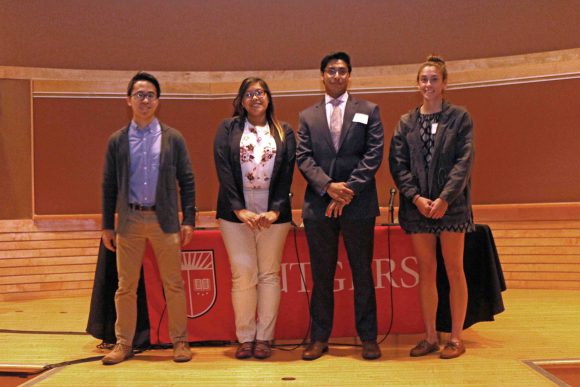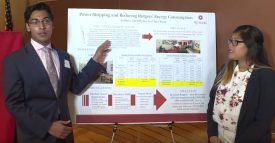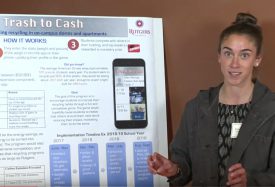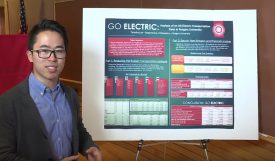
Energy Institute Innovation Contest winners (Left to Right) Timothy Lee, Tara Viray, Syed Hyder, and Mackenzie George.
The Rutgers Energy Institute (REI) annually challenges Rutgers undergraduates to develop innovative and implementable plans for reducing energy consumption on the New Brunswick campus with its Energy Innovation Contest.
The contest, now in its 10th year, represents the REI’s longstanding commitment to education and outreach. REI associate director, Kevin Lyons, from Rutgers Business School Department of Supply Chain Management presented this year’s awards at the 2017 REI Annual Symposium on May 3.
First place winners, who received a $2,500 prize, were Syed Hyder (Mechanical Engineering major, minor in Economics) and Tara Viray (Public Health major, minor in Biochemistry) for “Power Stripping and Reducing Rutgers’ Energy Consumption.”
Second place winner of $1,500 was Mackenzie George (Environmental, Policy, Institutions and Behavior major) for “Trash to Cash,” while third place winner of the $1,000 prize was Timothy Lee (Chemistry major) for “Go Electric: Analysis of an All-Electric Transportation Fleet at Rutgers University.”
REI associate director Rachael Shwom, Department of Human Ecology, has seen many innovative and technically feasible ideas proposed for the contest. “This contest gives students the opportunity and incentive to explore unique solutions and really dig in and develop them. I’ve been very impressed with the quality of entries and the students always learn a lot from the process.”
The contest has provided students the unique opportunity to engage with their university environment and the experts around them as they research and conduct technical, economic, and policy analyses to provide viable solutions to energy consumption and carbon reduction in their local environment. Several of the student proposals have been implemented by the University, most notably tray-less dining and use of aerobic digesters. Students have also gained internships with corporations that produce the researched technology from their REI contest proposals.
Top prize winner Tara Viray commented that the “contest really changed my mindset on my ability to make an impact in the Rutgers community. Our plan was simple enough, and the thing that mattered most to us was incorporating the students on campus to reduce their overall energy consumption. Through this contest I have become more aware of my energy consumption, and I hope that the outcome of our project will allow other students to be aware as well.”

REI Innovation Contest 1st place winners Syed Hyder and Tara Viray.
This year’s winning plan, “Power Stripping and Reducing Rutgers’ Energy Consumption,” proposed to implement smart/advanced power strips into all on-campus residence halls. Smart or advanced power strips prevent standby power consumption, which is the electricity a device consumes when it is “off” but still plugged in. It is sometimes called “vampire energy” or “phantom energy.” At approximately $10 per power strip, they can potentially save around 5,000,000 kilowatt-hours and $540,000 per year. The goal is to educate and change how the average student consumes electricity, and the use of advanced power strips (APS) is a simple yet efficient way to save energy, money, and the environment. Learn more about standby power from the Lawrence Berkeley National Laboratory (LBNL) and advanced power strips (APS) from National Renewable Energy Laboratory (NREL).

REI Innovation Contest 2nd place winner Mackenzie George.
Mackenzie George, the second place winner this year, had this so say. “I recently became more interested in energy at Rutgers this past semester after taking Environmental Solutions with Professor Shwom. My main goal for the future of energy here at Rutgers is to increase public awareness and involvement. I think it is important to involve people in fun and innovative ways, which is partly what inspired my proposal in the first place. ‘Trash to Cash’ incentivizes recycling by turning it into a fun game where students compete against one another to reduce their impact. Overall, the entire experience was very thought-provoking, and I look forward to learning more about energy use and how I can help create a more efficient energy future during my time at Rutgers.”

REI Innovation Contest 3rd place winner Timothy Lee.
Third prize winner this year, Timothy Lee, took home the top prize in 2016. “The energy contest is a great way to engage students and have them thinking about local improvement. There is a facet of energy or efficiency that can be improved in every corner of our lives as Rutgers students: buses, dining hall waste, residence halls, etc. Making energy-efficient changes doesn’t have to make our lives harder or more conservative; it can instead improve our quality of life.” Timothy recently graduated and is going to pursue a Ph.D. next fall at University of Pennsylvania in Materials Science Engineering to develop clean energy solutions while incorporating his chemistry knowledge. “I’m very excited about what the future of energy holds for us,” said Lee, a sentiment echoed by the REI.
Learn more about the Rutgers Energy Institute and these winning proposals at the REI website. You can also view videos of the first place, second place and third place winners.

